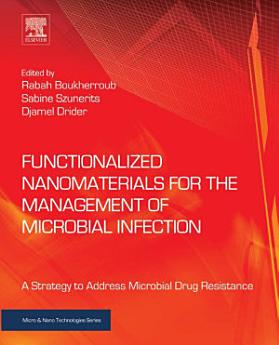Functionalized Nanomaterials for the Management of Microbial Infection: A Strategy to Address Microbial Drug Resistance
About this ebook
About the author
Rabah Boukherroub is Research Director Group Leader at the Institute of Electronics, Microelectronics and Nanotechnology, University of Lille, France. His research interests are in the area of synthesis of functional nanomaterials (metal and semiconductor nanoparticles, semiconductor nanowires, graphene, carbon dots, etc.), surface chemistry, and photophysics of semiconductor/metal nanostructures with emphasis on biosensors and lab-on-chip applications, drug delivery, and development of new tools for studying molecular dynamics in vivo.
Sabine Szunerits is since 2009 Professor in Chemistry at the University Lille 1, France and was nominated 2011 as member of the “Institut universitaire de France (IUF). Her current research interests are in the area of material science with emphasis on the development of novel analytical platforms and interfaces for the study of affinity binding events and in the modification of nanostructures (diamond particles, magnetic particles, nanographene) for biomedical applications. She is co-author of more than 230 research publications, wrote several book chapters and has 6 patents
Djamel Drider is full professor of Microbiology at Lille 1 University Sciences and Technologies. D. Drider obtained his PhD from Montpellier School of Agriculture and completed his postdoctoral training at Centro de Investigaciones Biologicas (Madrid, Spain) and Mount Sinai School of Medicine of New York University (USA). D. Drider was hired as Associate Professor at Nantes-Atlantic College of Veterinary Medicine; Food Science and Engineering (France). His research is mainly dedicated to antimicrobial peptides mainly those produced by lactic acid bacteria (bacteriocins).




